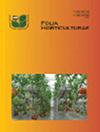Morphological characteristics of flower organs and in vitro micropropagation of male sterile lines of Lilium hybrids
IF 1.8
4区 农林科学
Q2 HORTICULTURE
引用次数: 0
Abstract
ABSTRACT Lily pollen causes many problems affecting humans’ quality of life and health, such as clothing contamination and skin or nasal allergies. The manual removal of anthers is time-consuming and labour-intensive, and thus, not conducive to commercial production. It is of great importance to produce pollen-free lily varieties with beautiful shapes. In this study, we studied the morphological characteristics of flower organs and polyploids of six pollen-free filial generations of four lily species and their micropropagations. Lily ‘5-21’ is male sterile and produces uncrackable anthers with inactive pollens under natural conditions. Lily ‘3-12’ is unable to produce anthers, because the petals become stamens, thereby leading to infertility. Lilies ‘3-1’, ‘5-4’, ‘5-35’ and ‘0-0.2’ are unable to produce anthers, because they lack floral organs. Polyploids of six hybrid lilies were identified by flow cytometry and chromosome counting, and the results showed that lily ‘5-4’ was triploid and the rest were diploid. Morphological observation indicated that flowering periods were from early July to early August and lasted for about 11 days. Six male sterile lilies had low seed setting rates when they were used as female parents. Most of the seeds were flaky with developed embryos. Therefore, asexual reproduction is optimal for these six male sterile lilies. The male sterility of six lilies was associated with their parents’ pollen activity. Scales of ‘5-4’ and ‘5-35’ were used as explants for in vitro micropropagation. The findings of the present study lay a foundation for breeding of pollen-free lilies.百合杂交种雄性不育系花器官形态特征及离体微繁
百合花粉引起许多影响人类生活质量和健康的问题,如服装污染和皮肤或鼻腔过敏。人工去除花药耗时耗力,不利于商业化生产。培育无花粉、外形美观的百合品种具有重要意义。本研究研究了4种百合的6个无花粉子代花器官和多倍体的形态特征及其微繁殖。百合' 5-21 '是雄性不育的,在自然条件下产生不开裂的花药和不活跃的花粉。百合' 3-12 '不能产生花药,因为花瓣变成了雄蕊,从而导致不育。百合' 3-1 ',' 5-4 ',' 5-35 '和' 0-0.2 '不能产生花药,因为它们缺乏花器官。通过流式细胞术和染色体计数对6株杂交百合的多倍体进行鉴定,结果表明,5-4为三倍体,其余为二倍体。花期为7月上旬至8月上旬,花期约11 d。6株雄性不育百合花作母本结实率较低。大多数种子是片状的,胚胎发育。因此,这6株雄性不育百合花的无性繁殖是最理想的。6株百合的雄性不育性与其亲本花粉活性有关。以‘5-4’和‘5-35’鳞片为外植体进行离体微繁。本研究结果为无花粉百合花的选育奠定了基础。
本文章由计算机程序翻译,如有差异,请以英文原文为准。
求助全文
约1分钟内获得全文
求助全文
来源期刊

Folia Horticulturae
Agricultural and Biological Sciences-Horticulture
CiteScore
3.40
自引率
0.00%
发文量
13
审稿时长
16 weeks
期刊介绍:
Folia Horticulturae is an international, scientific journal published in English. It covers a broad research spectrum of aspects related to horticultural science that are of interest to a wide scientific community and have an impact on progress in both basic and applied research carried out with the use of horticultural crops and their products. The journal’s aim is to disseminate recent findings and serve as a forum for presenting views as well as for discussing important problems and prospects of modern horticulture, particularly in relation to sustainable production of high yield and quality of horticultural products, including their impact on human health.
 求助内容:
求助内容: 应助结果提醒方式:
应助结果提醒方式:


